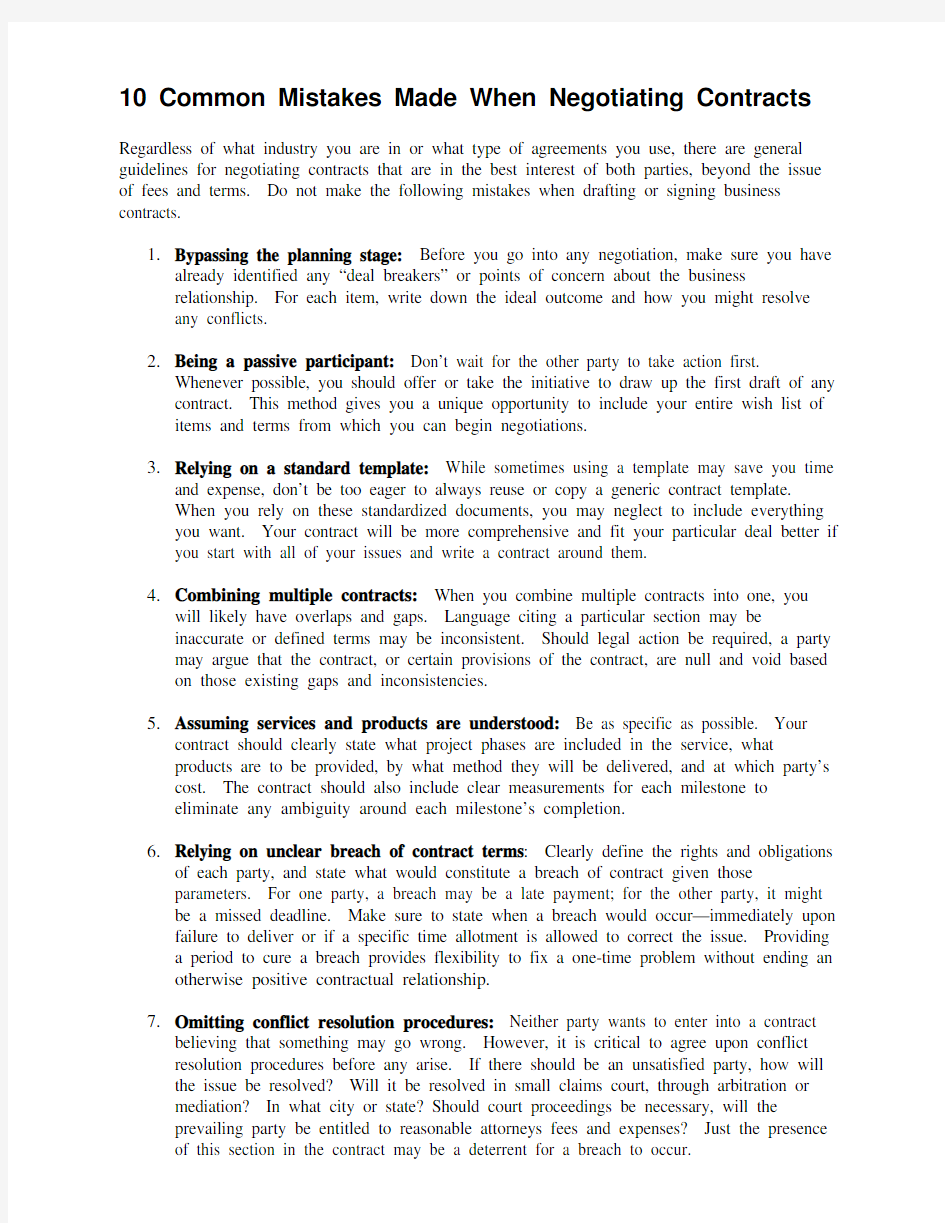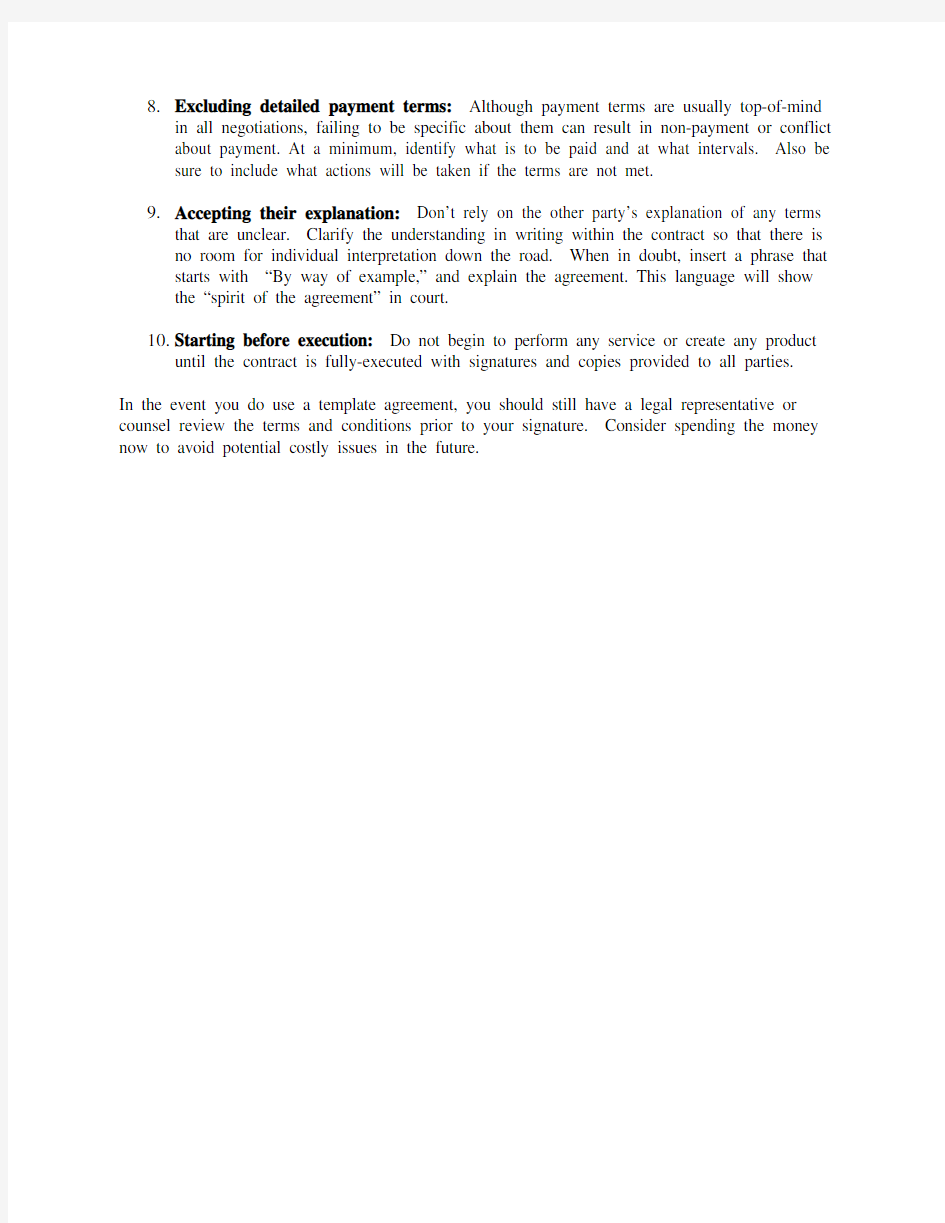10-Common-Mistakes-Made-When-Negotiating-Contracts


10 Common Mistakes Made When Negotiating Contracts Regardless of what industry you are in or what type of agreements you use, there are general guidelines for negotiating contracts that are in the best interest of both parties, beyond the issue of fees and terms. Do not make the following mistakes when drafting or signing business contracts.
1.Bypassing the planning stage: Before you go into any negotiation, make sure you have
already identified any “deal breakers” or points of concern about the business
relationship. For each item, write down the ideal outcome and how you might resolve
any conflicts.
2.Being a passive participant: Don’t wait for the other party to take action first.
Whenever possible, you should offer or take the initiative to draw up the first draft of any contract. This method gives you a unique opportunity to include your entire wish list of items and terms from which you can begin negotiations.
3.Relying on a standard template: While sometimes using a template may save you time
and expense, don’t be too eager to always reuse or copy a generic contract template.
When you rely on these standardized documents, you may neglect to include everything you want. Your contract will be more comprehensive and fit your particular deal better if you start with all of your issues and write a contract around them.
https://www.sodocs.net/doc/673317097.html,bining multiple contracts: When you combine multiple contracts into one, you
will likely have overlaps and gaps. Language citing a particular section may be
inaccurate or defined terms may be inconsistent. Should legal action be required, a party may argue that the contract, or certain provisions of the contract, are null and void based on those existing gaps and inconsistencies.
5.Assuming services and products are understood: Be as specific as possible. Your
contract should clearly state what project phases are included in the service, what
products are to be provided, by what method they will be delivered, and at which party’s cost. The contract should also include clear measurements for each milestone to
eliminate any ambiguity around each milestone’s completion.
6.Relying on unclear breach of contract terms: Clearly define the rights and obligations
of each party, and state what would constitute a breach of contract given those
parameters. For one party, a breach may be a late payment; for the other party, it might be a missed deadline. Make sure to state when a breach would occur—immediately upon failure to deliver or if a specific time allotment is allowed to correct the issue. Providing
a period to cure a breach provides flexibility to fix a one-time problem without ending an
otherwise positive contractual relationship.
7.Omitting conflict resolution procedures: Neither party wants to enter into a contract
believing that something may go wrong. However, it is critical to agree upon conflict
resolution procedures before any arise. If there should be an unsatisfied party, how will the issue be resolved? Will it be resolved in small claims court, through arbitration or
mediation? In what city or state? Should court proceedings be necessary, will the
prevailing party be entitled to reasonable attorneys fees and expenses? Just the presence of this section in the contract may be a deterrent for a breach to occur.
8.Excluding detailed payment terms: Although payment terms are usually top-of-mind
in all negotiations, failing to be specific about them can result in non-payment or conflict about payment. At a minimum, identify what is to be paid and at what intervals. Also be sure to include what actions will be taken if the terms are not met.
9.Accepting their explanation: Don’t rely on the other party’s explanation of any terms
that are unclear. Clarify the understanding in writing within the contract so that there is no room for individual interpretation down the road. When in doubt, insert a phrase that starts with “By way of example,” and explain the agreement. This language will show
the “spirit of the agreement” in court.
10.Starting before execution: Do not begin to perform any service or create any product
until the contract is fully-executed with signatures and copies provided to all parties.
In the event you do use a template agreement, you should still have a legal representative or counsel review the terms and conditions prior to your signature. Consider spending the money now to avoid potential costly issues in the future.
